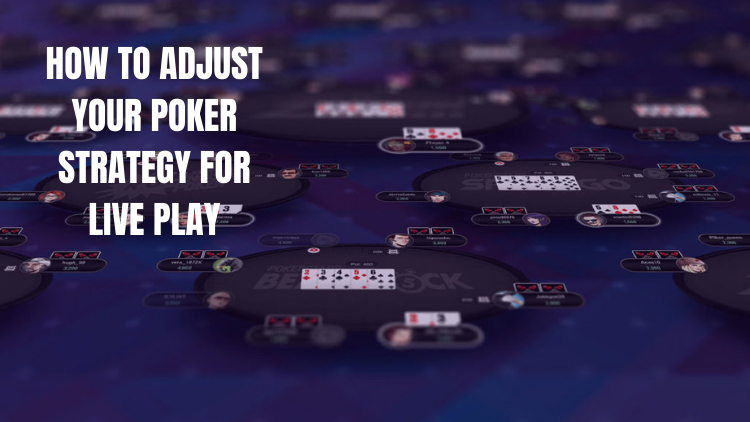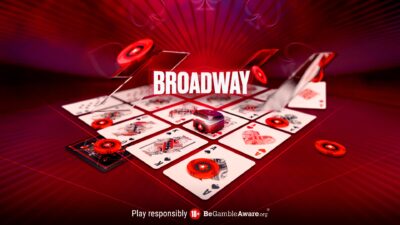Anyone who started their poker venture as an online player will recall sitting down at the casino tables for the first time. The nerves and excitement, the fumbling of chips, the constant need to be reminded to act in absence of a beeping timer.
There’s no doubt that playing at the casino is a completely different experience to playing online poker. But does this mean changing your approach to the game, and should you adjust your strategy?
Live and online poker are fundamentally the same game
Assuming you’re playing the same variation, the rules of poker will not change whether playing online or live. The hand strengths, percentages, and other fundamentals of the game are the same.
Your skills and knowledge are therefore highly transferable between an online and live poker setting.
However, if you do switch between online tables and the casinos, you will want to make several adjustments to your poker strategy based on the differences between these two environments.
You can make physical reads in live poker
The most crucial difference is that in live poker you’re physically sat with the other players, whereas in online poker your opponents are hidden behind a screen, their personalities concealed, or perhaps vaguely hinted at, by their avatar.
In live poker, body language, facial expressions, and mannerisms can all potentially paint a picture about other players and the meaning of their bets. For example, a player might throw chips more aggressively when bluffing, or only start talking when they have a decent hand.
Although not 100 percent reliable, experienced and new players alike will take these physical tells into consideration, and they can even make the difference between a call and a fold. Remember, opponents can also make these reads on you, so try not to sweat when you bluff the river.
In online poker, you have to rely more on betting patterns and timings in order to profile players. This will reveal more information than you think, but there’s no doubt that live poker has an added dimension in that respect. If you’re looking to play at the casinos in the coming months and years, physical hand reading is a skill you’ll want to cultivate.


The key difference… in live poker you can see and hear the people you’re playing against
Game speed and blind structures
Online poker generally plays much faster than live games. You can expect to see around double to triple the number of hands in the same amount of time online. This creates a difference not so much in poker strategy, but certainly in the dynamic of the game.
Live games may come across slow to an online player. However, if you stay focused you’ll be able to watch every detail closely, giving you yet more opportunity to profile players and gain an edge.
In tournament poker, the blind structure also makes a difference to how you should play. Some online tournaments have a much faster structure than typical live tourneys, so your strategy will often revolve around aggressive pre-flop play. Live poker tournaments often have deeper stacks, making for more post-flop play even in the later stages.
This is not a given, so always take note of the structures of any live or online event so you know how the pace and blinds will impact your strategy.
Differences in player types and gameplay
The rest of the advice to follow is based on potential differences between player types, and how the game is generally played in both the live and online poker environments.
We’re moving into the realm of generalizations here. Whereas it’s always true that live poker relies more on physical tells, it’s not always true that live games are softer or that the players are looser.
The differences between live and online poker are also not as well defined as they used to be. When online poker first sprang to life, players tended to stick to one or the other. Now, most of the top pros play both live and online events, and recreational players too will happily enjoy both, depending on the occasion.
Having said that, anecdotally speaking, and somewhat accepted as common knowledge, are the following:
Online poker games are tougher


A tough final table of poker players at the EPT Online
Online poker is much more accessible for recreational players, so in theory you’d think the games would be softer, but this is not often reported to be the case.
Most online “recreational” players still at least have an understanding of the basics, and many make use of poker strategy resources and training courses to level up their game. Online poker is also very appealing to the top pros, as they can put in the volume required to make a living.
Live poker games are known to be softer. Even the regulars at casino are not always concerned with optimizing their play. Live cash games are renowned for soft and loose play, while tournaments tend to be tight, but overall more of a mixed bag. When comparing the two, expect live games to be softer than online games of the same stakes.
Pre-flop raising
In online poker, the pre-flop raise size is usually between 2-3x the big blind, maybe up to 4x. There are mathematical reasons for this, but intuitively it makes sense. This raise size is big enough to make players fold their garbage, but not so much as to force players to fold all but their top holdings.
In live cash game poker, it’s not uncommon to see players open-raising 5-7x. It’s also not unusual for several callers to pay this price to “take a look” at the flop. This often leads to inflated multi-way pots.
Online poker players may be struck dumb by this butchery of the norms, but there are several ways you can adjust.
First, you can get paid off for your big hands by calling these huge raises or three-betting pre (and expecting a call). if the stacks are deep, you can play suited connectors and small pocket pairs in position to play for huge pots on the flop. On the flip side, don’t expect to easily steal blinds, and be prepared to feel the rage when your legitimate raise picks up six callers.
Live tournaments don’t tend to be as wayward pre-flop as cash games. In this case, some players will want to protect what they affectionately term their “tournament life”. Once they are out, they are out, and they can’t fire up another one. Players with this mindset may limp and limp-call into pots early on, and then tighten up and be reluctant to go all-in later. These are weaknesses that will be naturally exploited if you play your usual online poker strategy.
Bet sizing in live and online poker


Hmm… how many of these red chips makes up a third-pot?
Online poker players tend to think deeply about both their own, and their opponent’s bet sizing. In online poker, you can see the stacks, pot sizes and bets as a number, which helps players to think about bets in terms of percentages. Should you bet one-third or half the pot? It’s a common question asked by online players, not one you’ll here often on a Friday night in the casino.
if players are not considering sizing, then they may give away massive hints by betting small when scared and overbetting when they are confident. If opponents are only thinking about whether to “call or fold”, this also leaves you more room to tailor your own bet sizing.
This section is perhaps the biggest of the generalizations. Both live and online poker players are guilty of this, so really it’s up to you to identify these players at the tables and consider what their bet sizing means.
Conclusion
It’s fair to say that live and online poker are the same game, but that differences in the setting, pace, and types of players means that you have to make changes to your strategy.
The main difference is that you’ll want to brush up on your hand reading skills for live poker, as well as making use of the slow pace to watch opponents every moves.
Although we have (admittedly) generalized, you may also notice differences in the players, and therefore in the pre-flop and post-flop gameplay in live and online poker games. Whatever the case, study the other players carefully to gain an edge.
Live poker doesn’t require too many adjustments. If you’re confident online but new to the casino environment, then honestly the main challenge you’ll face is learning to deal with the cards and chips!








